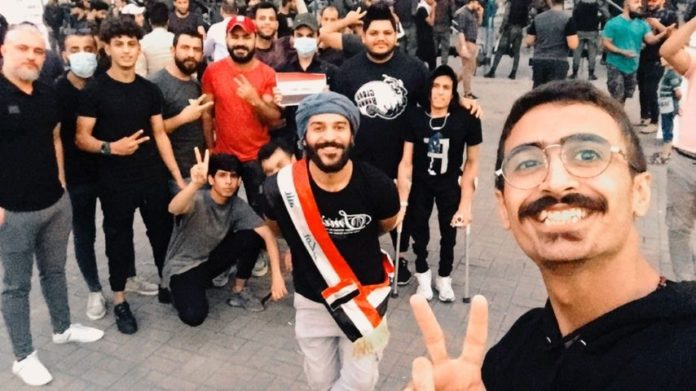On October 25, 2020, thousands of Iraqis took to the streets in Baghdad to commemorate the one year anniversary of the popular 2019 protests.
Six days later security forces cleared Tahrir Square of tents, bringing an end to the twelve-month occupation of the area by demonstrators.
The protests began in October 2019 in response to a number of issues, including rampant corruption, a lack of services, unemployment, foreign meddling and the demotion of popular military leader Abdul Wahab al-Saadi, a hero in the war on Isis.
The protests, which took part across the country, led to the resignation of Prime Minister Adil Abdul-Mahdi and caused his successor Mustafa al-Kadhimi to schedule early parliamentary elections for June 2021.
For many of Iraq’s entrenched elite, these demonstrations were a direct threat to their hegemony in the country, leading to a brutal crackdown on those involved.
Over seven hundred protesters were killed by security forces while thousands of others were injured or detained.
Additionally, a number of prominent activists now live in exile in fear of imprisonment or assassination in response to threats from militia groups such as the Iranian backed Kataib Hezbollah.

Hussein (not his real name) participated in the protests shortly after they began in October 2019. He had originally been inspired to join demonstrators after witnessing his compatriots risk their lives to demand a better Iraq.
“I decided to join in solidarity with the protesters. I saw how they were being killed and attacked by security forces,” he says.
“There are no services in Baghdad, the garbage collection is poor, there is rubbish on the streets, our water isn’t clean and electricity is regularly cut.
“The economic conditions created by the government means there are few opportunities for young people,” he adds.
For many of Iraq’s youth these issues are particularly frustrating considering the country’s vast natural resources.
Iraq has the world’s fifth largest proven oil reserves, which should assist in providing a comfortable living for its 38 million citizens.
However, the vast majority of this wealth disappears through corruption and cronyism long before it reaches the pockets of ordinary Iraqi citizens.
“All our dreams have been destroyed by this government and this system, despite this we saw these protests as our opportunity to bring about change and demand our rights.”
Hussein quickly became involved in a number of activities in Tahrir Square; he set up a tent to inform other protesters about environmental issues in Iraq, helped with logistics and provided information about the demonstrations to local and foreign media.
However, his role as an organiser made him a target for security forces.
“I began receiving threats, firstly over social media and then from the militias themselves, who would communicate threats to me through my family and neighbours.”
One day last December, Hussein was arrested at a checkpoint in Baghdad and taken to an unknown location nearby.
“I was blindfolded and handcuffed with my hands behind my back, for two days I didn’t see the sun. My family and friends didn’t know where I was,” he says.
“After a week in custody I ended up in court, accused of being a spy for international actors.”
“When I was released, further threats made it clear Baghdad was not safe for me and that my activism was putting my extended family at risk.”
As a result, Hussein departed Baghdad with his family for the Kurdistan Region shortly after his release. He is one of dozens of activists now living in exile, continuing his work out of the reaches of Iraq’s security forces and militias.

Back in Baghdad a small number of protesters continue to demonstrate. Haider Salman, a 22 year old artist, is one of approximately 100 people who protest twice a week at the Liberation Monument.
“Every Tuesday and Friday, my friends and I gather to protest, but attempts are being made to kill us,” says Haider.
“We want those who murdered the protesters to be held to account, but this has not been done so far.
“We are the new generation, the generation of the October Revolution. We are the ones who will one day be the presidents and prime ministers of Iraq.
“We continue to demonstrate because we want to see a new Iraq, an Iraq devoid of the militias and political parties that are controlling the state and killing us in cold blood.”





